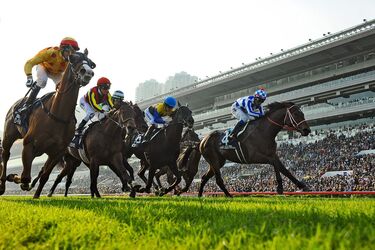Scientists believe racehorses have no idea they are racing

During the racing season, everyone becomes an expert on the horses that become the stars of this fascinating spectacle. TV presenters, professional experts and trainers talk about the "desire to win" of the favorite. In the race, horses "fight" on the track, distinguishing themselves with their "heart", "wisdom" and "determination".
But are horses capable of understanding that they are participating in a race, let alone wanting to win? Can they realize when their nose is the first to cross the finish line? Given our decades of experience and our knowledge of horse behavior, the answer to this question is probably "no," writes Science Alert.
Read also: In the US, a bear climbed into a house, ate chops and then escaped through a window (video)
From the horse's point of view, there are several intrinsic incentives to win the race. Finishing first can mean ending inconveniences such as the high pace and the jockey's whips. However, this advantage applies to all horses that cross the finish line. Typically, horses that win receive more whips in the final stretches to maintain their lead.
So, while achieving a winning place may be important for the horse's bond with the human, there is little benefit to the horse itself that would encourage it to want to gallop faster.
Are horses aware of their participation in the race? Again, the answer is probably no. Running, whether at a trot or a gallop, is a horse's primary activity, and they voluntarily run together in a group whenever they have the opportunity, even in jockeyless races. However, there is some reason to believe that horses do not have a desire to "win" in group races.
Horses are social animals. In nature, they synchronize their actions with other horses in the group to reduce individual exposure to predators. This synchronization includes maintaining the same speed, taking into account the positions of their bodies and other horses, and adapting their speed to the territory and danger signals.
In nature, "winning," that is, actually arriving first, can even be negative, as it increases the risk of falling victim to a predator.
This collective behavior is contrary to what owners, trainers, and jockeys demand during a race.
Racing depends on two factors related to the horse: the innate tendency to synchronize movements with other horses and the ability to train the horse to ignore this tendency during a race.
Trainers and jockeys also take into account the individual preferences of individual horses. Some horses don't want to be left behind during a race and are allowed to take the lead on the road. Other horses seek the safety of a group and stay with the others until they get close to the finish line.
Jockeys use several methods to convince horses to ignore their innate tendency to synchronize. For example, they can direct horses to be closer to other horses, force them to accelerate, or change the direction of the horse's movement.
In the early stages of a race, jockeys rely on the horses' instincts and allow them to stay with the group to maintain the physical effort required to stay in touch with the other horses.
Over time, this tendency to synchronize can be overcome and horses can act independently of the group in an effort to win.
Thus, it is likely that horses do not understand the nature of "winning" in a race until they are taught and trained to do so during training and competition. They learn about the process and learn by appropriate means, but it probably has nothing to do with their intrinsic desire to win.
As a reminder, in Alaska, a brown bear attacked tourists who were filming it.
If you want to get the latest news about the war and events in Ukraine, subscribe to our Telegram channel!
